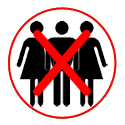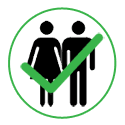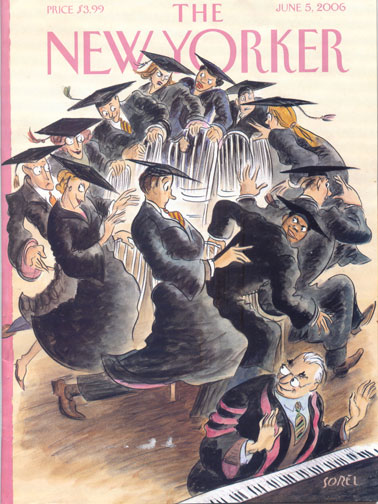 Polygamy, polygyny, polyandry, polyamory, polyfidelity… By whatever label, using whatever configuration, the concept of poly is to involve more than two people in intimate relationships. In the Western world, this practice is mostly seen as immoral. The legal marriage of multiple partners is largely illegal, and the unquestionable “rightness” of this idea is used and abused by both sides when the concept of same-sex marriage comes up.
Polygamy, polygyny, polyandry, polyamory, polyfidelity… By whatever label, using whatever configuration, the concept of poly is to involve more than two people in intimate relationships. In the Western world, this practice is mostly seen as immoral. The legal marriage of multiple partners is largely illegal, and the unquestionable “rightness” of this idea is used and abused by both sides when the concept of same-sex marriage comes up.
But I think that it’s time that we, as feminists, reframe this debate. We need to reach inside ourselves and ask why the idea of poly relationships feels wrong. What is it that makes the stereotype of polygamy objectionable? Is it the idea that monogamy isn’t the only healthy relationship style, or that the only example of poly relationships have been ones that traffic in women?
I. Challenging Deeply Held Beliefs
Like most Americans, I was brought up to believe that marriage was something that happened between a man and a woman. I don’t remember when the idea was challeged in terms of same-sex partnerships, but I distinctly remember when my belief that polygamy was inherently bad was called into question.
I was in high school at the time. Standing in my kitchen with someone — I forget if it was a family member or a friend — I think I was reading something about polygamy, but maybe it just came up randomly in conversation. I said something about polygamy being wrong. The person I was talking to countered with, “Why?”
I looked at them and blinked. Immediately I thought about the places in Utah where young girls are forced to marry older men. That’s what most of us think of first, isn’t it? But, a young girl being forced to marry a man is morally repugnant whether or not he’s done this to other women or not. And it is, for the most part, illegal whether it’s his first wife or fifth. Then… what? It just felt more wrong? Come on.
So I gave the only answer I could. I said, “I don’t know. Maybe it’s not.”
Since then, I’ve tried my best not to accept that something is one way just because that’s the way I’ve been taught it was. In the case of polygamy, the more I’ve learned about it, the more I realized that it was a lot more complex than the usual idea that it’s a bunch of old guys marrying underaged girls in Utah or the Middle East.
For instance, did you know that “polygamy” doesn’t actually mean that it’s a man with multiple wives (that would be polygyny), but can also be a woman with multiple husbands (polyandry)? Or that there’s a movement out there called polyamory (often referred to as “poly”)? A lot of people think that “polygamy” begins and ends with forced marriages of older men to younger women (not so different from traditional heterosexual marriage), and that therefore there is no other kind of configuration possible. But, if nothing else, polyamory tells a different story. There’s everything from Vs (one partner in the middle with two attached to hir), to triangles (all three partners connected to each other), to complex connections that end up forming a tight-knit community brought together by friendship, love, and sex.
II. Compulsory Monogamy
 For some people, finding one person at a time to share their lives with is the only way to go. And, hey, if that’s your cup of tea, that’s great. But not everyone is like that. Just like not everyone is attracted to a different gender, or the same one, or any person at all, not everyone wants to be with just one person. It’s not better or worse, it’s just different. And it’s no more fair to say that everyone should only love one person than it is to say that only people of the same gender, class, race, etc. can love each other.
For some people, finding one person at a time to share their lives with is the only way to go. And, hey, if that’s your cup of tea, that’s great. But not everyone is like that. Just like not everyone is attracted to a different gender, or the same one, or any person at all, not everyone wants to be with just one person. It’s not better or worse, it’s just different. And it’s no more fair to say that everyone should only love one person than it is to say that only people of the same gender, class, race, etc. can love each other.
How can we fight against mandatory gender roles, heterosexism, racism, ablism, etc. and then go on believing that a romantic relationship can only exist between two people? How can we go on promoting this idea — either by our vocal assent or our conspicuous silence — and then expect our arguments against having other people’s ideals imposed on us to be taken seriously? I don’t think that we can.
If a relationship is filled with loving, consenting adults then what business is it of ours what configuration makes them happy?
III. Refocusing Our Efforts
Which brings me back to what I think is obscured by the “immorality” argument of polygamy: human rights abuses. Putting aside the problems we have a society recognizing and dealing with abuse (as that is a whole series of posts in of itself), when abuse is recognized in a heterosexual monogamous relationship, the configuration of the relationship is rarely, if ever, seen as the important factor.
Let me use this case from 2001, reported by CNN.com, as an example. The defendant was put on trial for bigamy and failure to pay child support. The article spends several paragraphs talking about Mormons and polygamy, and then ends the article with this:
The defense focused its efforts on parrying prosecution charges that Green married teenagers, divorced them and then collected their welfare payments as he continued living with them.
Green also faces a charge of first-degree felony rape of a 13-year-old girl with whom he allegedly had sex in 1986. He subsequently married the girl. The charge carries a prison term of five years to life, Reuters reported. A trial date is yet to be set.
What this article, and all the other ones like it that I’ve seen, have done is capitalize on the sensationalism of “Multiple! Wives! How Weird! And Thefore WRONG!” and either downplayed the way in which these women are used as chattel — taken, raped, and married as soon as they are biologically able to have children — or used them as a tool with which to strengthen the “wrongness” of mutiple marriage.
The suffering of these women should not be seen as evidence to support the case against polygamy, it should be treated as an important problem by itself. By making polygamy the main “evil” here, the focus is not on the actual harm being done but on the supposed immorality of non-monogamy. Furthermore, by using the abuse of women in a case against polygamy, it creates an idea that these kinds of things are unique to polygamy, instead of them being a greater narrative of traditional relationships of all kinds.
IV. Concusion
 As feminists, I think that we can all agree that loving who we love is not wrong. I think that we can agree that people should be free to pursue happiness they way they need to as long as it doesn’t hurt others (a thorny subject, I know, but I think it’s a principle we can all get behind). I think we can agree that what happens between consenting adults is their business.
As feminists, I think that we can all agree that loving who we love is not wrong. I think that we can agree that people should be free to pursue happiness they way they need to as long as it doesn’t hurt others (a thorny subject, I know, but I think it’s a principle we can all get behind). I think we can agree that what happens between consenting adults is their business.
But, by allowing the debate about polygamy to be focused on mutliple-partnerships being morally wrong, all we’re doing is buying into the idea that one way — monogamy — is the best and only acceptable way. Not just that, but we’re also allowing the focus to be taken off the real atrocity: the trafficking of women. Traditional polygamy is no different than traditional marriage in this respect, and to allow oursleves to pretend it is is a disservice to the fight for women’s rights.


 Another issue that has been overlooked by E3’s ban on booth babes, and apparently any woman atendee whom they deem inappropriate, is that it severely limits women’s ability to cosplay as female characters. Especially female characters in upcoming games.
Another issue that has been overlooked by E3’s ban on booth babes, and apparently any woman atendee whom they deem inappropriate, is that it severely limits women’s ability to cosplay as female characters. Especially female characters in upcoming games.


